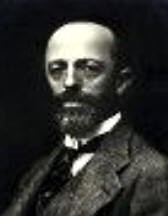
Leone Sinigaglia
Born: 1868Died: 1944
Education: self-taught
Career: composer
Leone Sinigaglia (14 August 1868 - 16 May 1944) was an Italian composer and mountaineer. Born in Turin into an upper middle class family, Sinigaglia knew the leading figures of thought, arts and science that lived in the city at the time, such as Galileo Ferraris, Cesare Lombroso, and Leonardo Bistolfi. A lover of literature and mountaineering from an early age, the young Sinigaglia spent many holidays in or near Cavoretto, just outside the city, a place that would provide him with much inspiration. Among the works composed in these Turinese years are the Romanza opus 3 for horn and string quartet. (This has been recorded in an arrangement for horn and string orchestra.) In 1888 Sinigaglia began to travel: after spells in several European cities, from 1894 he lived in Vienna, where he associated with Johannes Brahms from whom he developed a taste for so-called absolute music, studying with Eusebius Mandyczewski. In these years he wrote several Lieder and the Concerto for violin and orchestra, opus 20. From 1900 he worked in Prague with Antonín Dvořák (whom he possibly met through his friendship with the Bohemian Quartet in Vienna). From Dvořák he learned the ability to apply classical techniques to the arrangement of popular songs. His productivity diminished progressively in the following decades, during which European music underwent far-reaching changes. He died during the Second World War, in tragic circumstances: his Jewish origins made him subject to the persecutions of the Nazi police who occupied Turin during 1944; despite his 75 years he was to be sent to Germany as slave labour, but suffered a fatal heart attack at the moment of his arrest.

